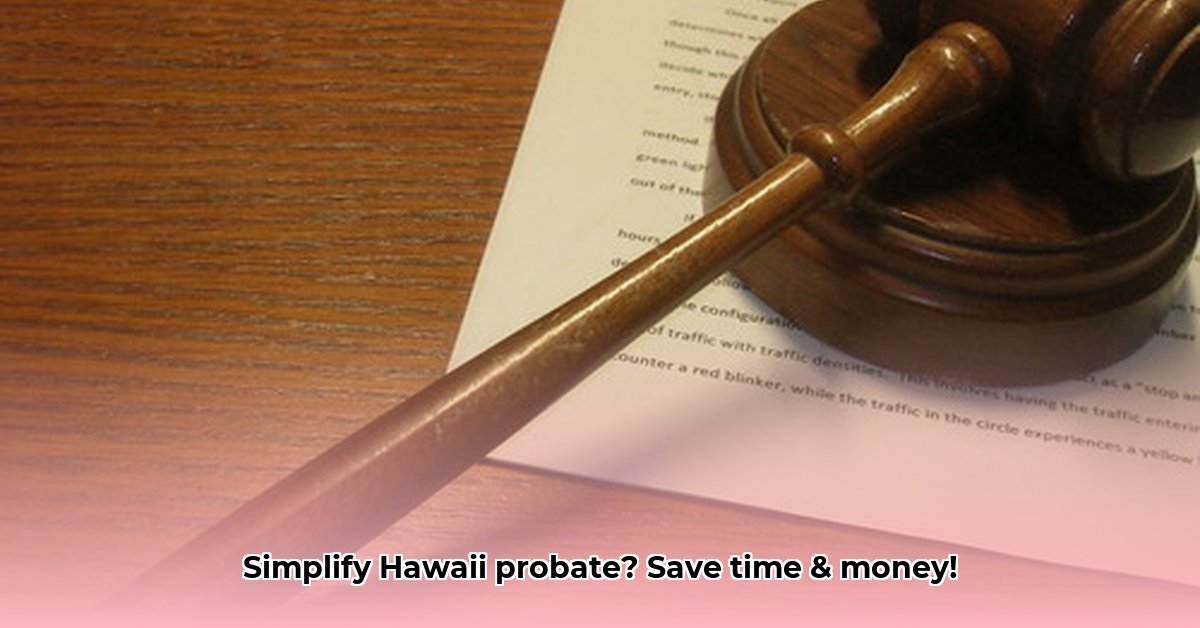
Dealing with the death of a loved one is difficult. Navigating the probate process in Hawaii can add to the emotional burden. This guide provides a clear, step-by-step approach to understanding and streamlining Hawaii's probate rules, whether you're handling a large or small estate. We'll explore when probate is necessary, the steps involved, and strategies for saving time and money. We'll also address potential challenges to ensure a smoother process.
When Probate is Needed (and When It Isn't)
Probate is the legal process of managing and distributing a deceased person's assets. In Hawaii, it's often needed when someone dies without a will (intestate) or without proper estate planning. However, several strategies can minimize or eliminate the need for probate:
- Living Trusts: A living trust holds assets, distributing them per your instructions after death, bypassing probate court.
- Beneficiary Designations: Designating beneficiaries for assets like retirement accounts or life insurance ensures direct transfer, avoiding probate.
Important Note: While these methods are effective for many assets, real estate and other complex assets may still require probate unless specifically addressed in advanced estate planning. For example, if your grandmother had a will, a life insurance policy with you as a beneficiary, and a house, the insurance money bypasses probate, but the house and other assets may still need court approval unless planned for otherwise.
The Hawaii Probate Process: A Step-by-Step Guide
The Hawaii probate process, governed by the Hawaii Revised Statutes (HRS) Title 560, generally involves these steps:
Filing the Petition: The executor (named in the will or appointed by the court) files a petition with the appropriate Hawaii Circuit Court, initiating the probate process. This petition outlines the assets and debts of the deceased.
Asset Inventory and Appraisal: All assets are identified and professionally appraised to determine their current market value. Accuracy at this stage is crucial for a smooth process. Inaccurate valuations can lead to delays.
Notice to Creditors: Creditors (individuals or entities owed money by the deceased) are notified to file claims against the estate within a specific timeframe (this timeframe is mandated by law).
Debt Payment: The executor pays off all valid debts, taxes, and expenses, typically following a legally established order of precedence.
Asset Distribution: After debts are settled, remaining assets are distributed to the beneficiaries as specified in the will or according to Hawaii's intestacy laws (laws determining inheritance when no will exists). This is usually a complex process and may take a year or even longer to complete. Did you know that the average probate case in Hawaii takes between 6 to 18 months to conclude?
Question: Given the complexity of these steps, wouldn't it be advantageous to have legal assistance to ensure everything is handled correctly and efficiently?
Simplified Probate in Hawaii: A Faster, Cheaper Option
Hawaii offers simplified probate for smaller estates, typically those valued under $100,000 in personal property. This streamlined process involves less court oversight and paperwork, resulting in significant cost and time savings. However, eligibility criteria must be met as outlined in the HRS 560:3-1201 (always check for the most up-to-date information).
Roles and Responsibilities: Executors and Beneficiaries
Two key roles are crucial in probate:
The Executor: Manages all aspects of the probate, including asset collection, debt settlement, and asset distribution. They act as the fiduciary responsible for representing the estate's interests.
The Beneficiaries: The individuals entitled to inherit from the estate. They have the right to monitor the probate process and ensure fair distribution.
Potential Challenges and Mitigation Strategies
While probate is usually straightforward, potential challenges include:
Will Contests: Disputes over will validity can delay the process significantly. A well-drafted will, executed correctly, minimizes this risk.
Asset Disputes: Conflicts amongst heirs regarding asset distribution necessitate court intervention. Open communication among family members before the probate process begins is critical for effective dispute resolution.
Hidden Debts: Unforeseen debts emerging during probate can complicate matters. Thorough financial record-keeping before and during the process is essential.
Managing Probate Costs: Budgeting for Expenses
Probate expenses vary but typically include court filing fees, executor fees, attorney fees, and appraiser fees. The cost can range widely depending on the estate's complexity and size. Planning strategies like using simplified probate, preparing a clear will, and choosing an experienced but cost-effective executor are essential factors to consider.
Conclusion: Plan Ahead for a Smoother Process
Proper estate planning is vital for minimizing probate costs and delays. Strategies like living trusts and beneficiary designations can help avoid probate altogether. However, complex estates often benefit from legal counsel to ensure the process is handled efficiently and legally. This guide provides a valuable overview, but seeking the advice of an experienced Hawaii estate planning attorney is strongly recommended for complex situations. Remember, proactive planning can ease the burden on your loved ones during a difficult time.